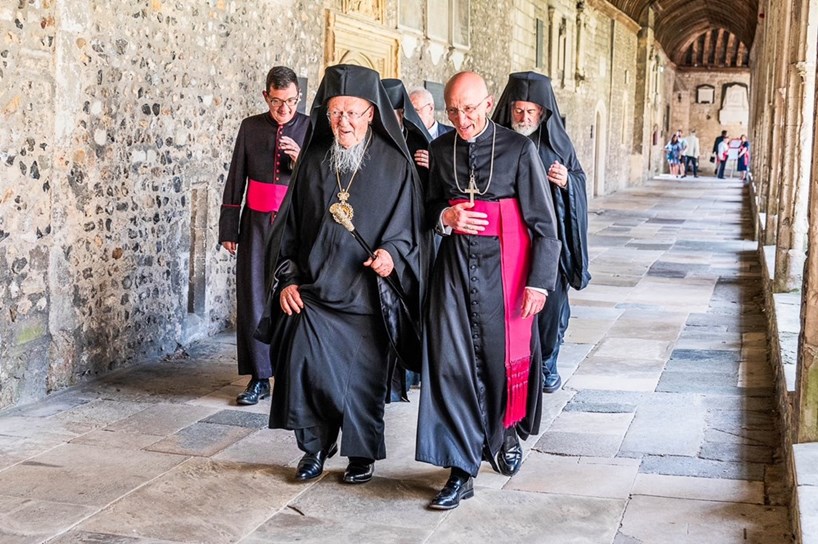DURING his visit to the UK this week, the Ecumenical Patriarch, Bartholomew of Constantinople, spoke of the timelessness of “our vocation to unity”.
Patriarch Bartholomew, who is primus inter pares among the patriarchs of the Eastern Orthodox Churches, was the guest at a Nikaean Club lunch in central London, hosted by the Archbishop of York, on Tuesday. At the gathering, the Patriarch described the fellowship as “leading us to the sacred space of dialogue where we can discover the commonalities . . . as willing and devoted partners who share homoousios, a shared humanity”.
His reference — rendered in the creed as “of one being” — was to the Council of Nicaea which marks its 1700th anniversary this year, and from which the club takes its name. The Nikaean Club was established in 1926 to support the archbishops in their ecumenical work, and helps to facilitate hospitality and dialogue for the Church of England’s ecumenical delegations.
Archbishop Cottrell spoke of “all that we hold dear and all that we hold in common”. He said: “This shared faith means everything to us, and it is a joy beyond measure to express our fellowship, our koinonía, in the faith, and, as far as we can at present, to experience our communion with one another in Christ.”
 Gerry LynchPatriarch Bartholomew of Constantinople with the Bishop of Chichester, Dr Martin Warner, and the Dean of Chichester, the Very Revd Dr Edward Dowler
Gerry LynchPatriarch Bartholomew of Constantinople with the Bishop of Chichester, Dr Martin Warner, and the Dean of Chichester, the Very Revd Dr Edward Dowler
Speaking to the Church Times afterwards, he commented on the “deep personal holiness” of the Patriarch, along with his longstanding theological leadership on the environment.
The two had been together the weekend before, in Chichester, for the Ecclesiastical Law Society’s (ELS) “Nicaea Received” conference, at which the Patriarch gave the final keynote address. He was awarded a Fellowship of the ELS by its President, the former Bishop of Guildford the Rt Revd Christopher Hill, who said that this was “the first Fellowship in the Society’s history, and reserved for those who have made ‘a contribution of great and lasting significance to the study and of ecclesiastical and canon law’”. Bishop Hill spoke of the Patriarch’s commitment to “the principles of Christian law, issues to do with Europe (and the EU) and religion, human rights and Orthodoxy, and religious freedom. . . He has consistently encouraged the ecumenical study of canon law.”
Patriarch Bartholomew also preached at evensong in Chichester Cathedral on Saturday, which the Dean, the Very Revd Dr Edward Dowler, described as “a great privilege” for the cathedral. “Patriarch Bartholomew brings us into contact with the 300 million members of those churches worldwide,” he said. “And, as a Christian bishop living in severely constricted circumstances in what is now modern Turkey, he reminds us of our brothers and sisters in the persecuted churches around the world whom we are tragically liable to forget.”
The Bishop of Chichester, Dr Martin Warner, who welcomed the delegation, praised the Patriarch and his contribution to ecumenism. “Patriarch Bartholomew reminded us that the canons of Nicaea are a living voice, through which the Holy Spirit unites us in the scriptures and draws us into unity with the Church across time and in every place,” he said.
“The presence of the breath of the East, with its emphasis on the work of the Holy Spirit and its profound Christian anthropology, brought enrichment and joy to us in Chichester. In the light of this teaching, we saw ourselves afresh in the continuum of faith. We recognised ourselves as brothers and sisters, part of a family that is too often unfamiliar to us and loves us when we meet.”
Patriarch Bartholomew was awarded the Templeton Prize earlier this year for his pioneering efforts “to bridge scientific and spiritual understandings of humanity’s relationship with the natural world” (News, 11 April).















